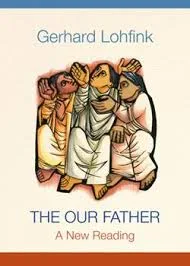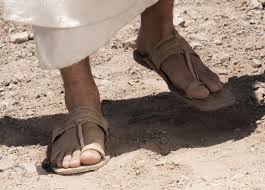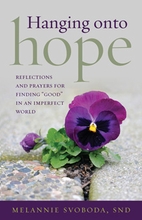The Our Father might be the most prayed prayer in the world. We teach it to our little children, pray it at every Mass, and often recite it at the bedside of our beloved sick or dying. The German theologian, Gerhard Lohfink, has written a new book on the Our Father. It’s small but “meaty.” Today I will share five of his thoughts from chapter one.
First, there are two versions of the Our Father in scripture: Lk. 11:1-4 and Mt. 6:9-15. In Luke, the Our Father is Jesus’ answer to the disciples’ plea, “Lord, teach us to pray.” In Matthew, the prayer is part of the Sermon on the Mount. In his first chapter, Lohfink gives five general observations about the prayer.

The Our Father is pure petition. Some recitations of the Our Father end with this doxology: “for the kingdom and the power and the glory are yours, now and forever.” These words are not part of the original Our Father, but were added many years later. “The original Our Father was nothing but petition,” says Lohfink.
The Our Father is short. In English, the Our Father contains only 55 words. Luke’s version contains only 23 words. Why is it so short? Lohfink says the answer is in Mt. 6:7-8 where Jesus says, “When you are praying, do not heap up empty phrases as the Gentiles do; for they think that they will be heard because of their many words.” When it comes to prayer, Jesus seems to be saying, “Fewer words are better than many.”
The Our Father gets right to the point. There is a tradition is some Jewish prayers and other Near Eastern prayers to begin each prayer by addressing God the way you would address a King or other ruler—with many words of praise before expressing your needs. But the Our Father skips such highly ritualized words. It begins with only two words: Our Father. The language is familial, not solemn or courtly. In some ways, this is revolutionary.
God’s interest comes first. The petitions in the Our Father are divided into two parts. In Matthew’s version, there are three thou askings: Hallowed be thy name… thy kingdom come… thy will be done. Then there are four we petitions: Give us today our daily bread… forgive us our trespasses… lead us not into temptation… but deliver us from evil.
The first part, says Lohfink, deals with “the reign, name, and will of God.” The second part deals with the “disciples interests—concerning their food, their sinfulness, the crisis of temptations.” The structure of the Our Father matches Jesus’ admonition: “But strive first for the kingdom of God and his righteousness, and all things will be given to you as well” (Mt. 6:33).

God acts through people. The first three petitions “are oddly constructed: Hallowed be they name; thy kingdom come; thy will be done.” The construction raises the question, WHO is going to do this? God or us? Lohfink concludes that the correct answer to that question is BOTH God and us. He says the Our Father expresses “a fundamental theological insight: God takes the initiative. God acts. Everything comes from God. And yet, because of the independence and freedom God wills for human beings, God can do nothing in the world unless there are people who are prepared to make God’s will their own and thus make space for God to act.”
The very structure of the Our Father can give us a greater appreciation of this beloved prayer. Lohfink concludes this chapter with these vital words: “In the Our Father, Jesus summarized all he wanted and hoped for.” In future blogs, I will share a few more thoughts from this beautiful book.
For reflection:
What has been your experience praying the Our Father? Or what does this prayer mean for you?
Was there anything in this reflection that was new to you? that you appreciated? that challenged you?
Here are two versions of the Our Father for your prayer. The first is a recitation of the prayer with an unusual fall visual. The second is the Our Father sung in Aramaic, Jesus’ native language. Both versions include the doxology.
The Our Father recited:
Here is the Our Father sung in Aramaic:
I welcome your comments below!







9 Responses
Sr. M,
I love your blog but some time ago I stopped receiving it im my email. How can I
I start receiving it sgain?
Kindly,
Mary Kay
Dear Mary Kay, Many subscribers of my blog are not getting it anymore. Our IT team is looking into the problem. Meanwhile, you can search for my blog (Sunflower Seeds Sister Melannie) and it should come up. You can bookmark it to make it easier for you to get it every week. Thank you for your patience. I don’t want to lose you as a reader! Sr. Melannie
Good morning, Sr. Melannie…
I have read this book, and, yes, it is indeed “meaty”! When I think of the Our Father, I think of many things: one, as you said, probably one of the first prayers I learned, a prayer I ‘m sure that will stay with me as I age. My wife’s mother, Mary Lee, suffered from dementia towards the end of her life, but she never forgot the Our Father (or the Hail Mary!). Two, back in the days when my children were small and we all went to Mass, we would always hold hands during this prayer. I miss those days. Third, perhaps the brevity of the prayer implies more time in the market place working on the “thy will be done” part of it. Pope Francis wants us to engage and accompany. Let us say our prayer and get out there!
On another note: How about those Browns!
Thank you, John, for your response. I was touched by your mother-in-law who never forgot the Our Father and Hail Mary despite her dementia. And your image of your family holding hands during the reciting of the Our Father at Mass is a cherished memory for sure. And I liked your take on the brevity of the Our Father: that we should be spending more time in the market place working on the “thy will be done” part of the prayer. Well said!… and (of yes!) How about those Cleveland Browns beating the Cincinnati Bengals pretty decisively Monday night?! Amazing! There’s much joy in northeast Ohio over that win! Thanks again… Melannie
Good afternoon. The paragraph on “God acts through people” caught me. God can have all kinds of things He wants to accomplish, but if I (we) don’t say yes-nothing gets done. Thank God that Mary said yes to Him and Jesus came to us.
(Still not getting your weekly posts-but I am looking them up.)
Dear Celeste, Thank you for your comment. I liked the way you stress how important it is for us to say our “yes” to partner with God to bring about the Kingdom. And yes, Mary is such a beautiful, strong example for all of us! Sr. Melannie
“Baba Yetu” (Christopher Tin, composer) is essentially the Lord’s Prayer sung in Swahili. The title translated means “Our Father.” Interestingly, this song was composed as a theme for a video game!
Many choirs have sung this over the last 15+ years, and their renditions can be found on YouTube. This song moves me to tears *every time*, even after the many times I’ve listened to/prayed it.
Here’s one: https://www.youtube.com/watch?v=vsINANZ6Riw
Hard to believe this one was done virtually during COVID: https://www.youtube.com/watch?v=30_mwwn_kjA
May its beauty and meaning move you, too.
Baba yetu, yetu uliye
Mbinguni yetu, yetu amina!
Baba yetu yetu uliye
Jina lako e litukuzwe.
Utupe leo chakula chetu
Tunachohitaji, utusamehe
Makosa yetu, hey!
Kama nasi tunavyowasamehe
Waliotukosea usitutie
Katika majaribu, lakini
Utuokoe, na yule, muovu e milele!
Ufalme wako ufike utakalo
Lifanyike duniani kama mbinguni.
(Amina)
Our Father, who art
in Heaven. Amen!
Our Father,
Hallowed be thy name.
Give us this day our daily bread,
Forgive us of
our trespasses,
As we forgive others
Who trespass against us
Lead us not into temptation, but
deliver us from the evil one forever.
Thy kingdom come, thy will be done
On Earth as it is in Heaven.
(Amen)
Dear Char, Thank you for sending these two versions of the Our Father in Swahili. They are wonderful! So moving! So alive! So prayerful. I recommend both of them to my readers. I also enjoyed reading the comments that went along with the videos–how people from all over the wor;d found these videos so inspiring. Thanks again, Char! Gratefully, Melannie
I know I’m commenting to this blog quite late because I only just now read it. I wanted to let your readers know that if they wanted to hear another sung version, Andrea Bocelli sang the Lord’s Prayer with the Morman Tabernacle choir. It is on his Christmas album of a few years ago, even though that is not really a Christmas song! It is also available on YouTube. It is a stunning rendition!